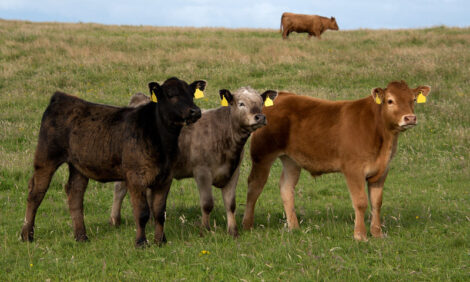



Shorthorn Genetics Offer Safe Way into Traditional Beef
UK – A beef Shorthorn scheme quoting a 20 p/kg premium could offer a secure way into the traditional beef market for beef and dairy farmers battling tough prices.By renting bulls for two year periods or buying high quality semen, farmers can reduce the initial time and cost in sourcing high quality beef genetics, while tapping into calf premiums offered by supermarket chain Morrisons.
Plans are to rent bulls to dairy farmers for £12 a week before buying back progeny at 14 to 28 days of age.
Beef farms can also register, although these operations must take stock through to finishing and not sell progeny at store sales.
Heifers and steers meeting specifications on 260-380kg at O+ or better and 4L or 4H fat are currently worth £76 ahead, according to livestock trader, Buitelaar International, which is steering the programme with Sterling Sires.
Buitelaar has reported high demand for beef Shorthorn. "We have made an undertaking to Morrisons to increase their dependable supply of Shorthorn beef and enable them to fulfil as yet unsatisfied demand from customers," said Adam Buitelaar, managing director of Buitelaar International.
Once registered, farms can either incorporate Shorthorn genetics via bulls or artificial insemination.
Sterling Sires recently secured the services of top bull Tofts Wing Commander (pictured), which rates in the top 0.2 per cent of the breed.
Potential to Meet Demand
The partnership has targeted a supply of 10-15,000 Shorthorns annually by distributing 300 bulls across England, with three calf collection centres in the west of the country near Garstang, Wrexham and Frome.
Bulls will cost £600 a year for two years, at which point a younger replacement will be supplied. All bulls will be fertility guaranteed with health tests passed for bTB, Mycoplasma bovis and Johnes’ and vaccinated for BVD, IBR and Leptospriosis.
Any bulls that go lame or suffer health problems are replaced straight away.
Bulls aren't exchanged between farms on the scheme. When a bull leaves its original farm the only place it can go is an abattoir.
A Place for Shorthorns
Mr Buitelaar said: “Morrisons have always favoured Shorthorn but there are only so many currently on the ground at the moment - long term, we’d like to see more.”
Ideally, Adam envisages calves being 55-60kg, setting the minimum at 50kg.
Calves will be paid according to the weights of the Angus premium that week.
The ‘ideal situation’ is for clean calves to come, but he added he “won’t be letting down” farmers hit by tuberculosis.
Gloucestershire beef farmer Paul Westaway of Sterling Sires was keen to support the scheme for two reasons.
“We’ve been enthused by what Morrisons is trying to do and we are keen to put in place leasing models for bulls,” said Mr Westaway.
He sees time and money potentially saved for registered farms. Businesses don’t have to search for bulls themselves or ‘gamble’ on buying a bull at times of poor beef and milk prices.
"I have arrangements in place with some of the large Shorthorn breeders in Scotland to get the genetics," he added.
"If we had to find 300 bulls by tomorrow, we could."
Referring to the Shorthorn scheme, he said there had been good intentions in the past, and added: "I think the scheme will fly now."
Michael Priestley
News Team - Editor
Mainly production and market stories on ruminants sector. Works closely with sustainability consultants at FAI Farms



